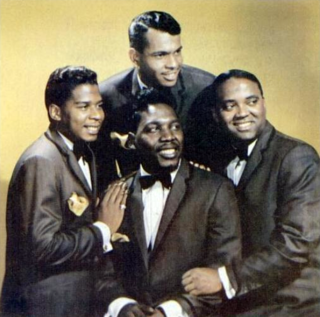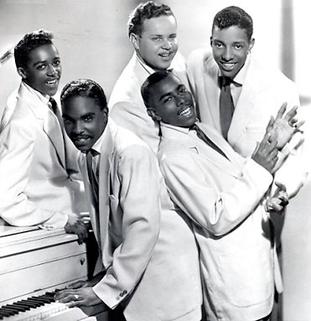Related Research Articles

Doo-wop is a genre of rhythm and blues music that originated in African-American communities during the 1940s, mainly in the large cities of the United States, including New York, Philadelphia, Pittsburgh, Chicago, Baltimore, Newark, Detroit, Washington, DC, and Los Angeles. It features vocal group harmony that carries an engaging melodic line to a simple beat with little or no instrumentation. Lyrics are simple, usually about love, sung by a lead vocal over background vocals, and often featuring, in the bridge, a melodramatically heartfelt recitative addressed to the beloved. Harmonic singing of nonsense syllables is a common characteristic of these songs. Gaining popularity in the 1950s, doo-wop was "artistically and commercially viable" until the early 1960s, but continued to influence performers in other genres.

The Drifters are an American doo-wop and R&B/soul vocal group. They were originally formed as a backing group for Clyde McPhatter, formerly the lead tenor of Billy Ward and his Dominoes in 1953. The second group of Drifters, formed in 1959 and led by Ben E. King, were originally an up-and-coming group named The Five Crowns. After 1965 members drifted in and out of both groups and many of these formed other groups of Drifters as well. Several groups of Drifters can trace roots back to these original groups, but contain few—if any—original members.

The Flamingos are an American doo-wop group formed in Chicago in 1953. The band became popular in mid-to-late 1950s and are known for their 1959 cover version of "I Only Have Eyes for You". They have since been hailed as one of the finest and most influential vocal groups in pop and doo wop music history. In 2001, the band was inducted into the Rock and Roll Hall of Fame.
The Orioles were an American R&B group of the late 1940s and early 1950s, one of the earliest such vocal groups who established the basic pattern for the doo-wop sound.
The Turbans were an American doo-wop vocal group that formed in Philadelphia, Pennsylvania in 1953. The original members were: Al Banks, Matthew Platt, Charlie Williams (baritone), and Andrew "Chet" Jones (bass). They came from Downtown Philadelphia.
The Wrens were an American doo-wop vocal group from The Bronx, New York City. They are best known for their song "Come Back My Love".

The Del-Vikings were an American doo-wop musical group that recorded several hit singles in the 1950s and continued to record and tour with various lineups in later decades. The group is notable for the hit songs "Come Go with Me" and "Whispering Bells", and for having been a successful racially mixed musical group during a period of time when such groups were rare.
Shep and the Limelites was an American doo-wop trio of the early 1960s, composed of James "Shep" Sheppard, Clarence Bassett and Charles Baskerville. They are best known for their 1961 hit recording, "Daddy's Home", co-written by Sheppard.
The Dubs are an American doo wop vocal group formed in 1956, best known for their songs "Could This Be Magic", "Don't Ask Me to Be Lonely" and "Chapel of Dreams".
The Edsels were an American doo-wop group active during the late 1950s and early 1960s. The name of the group was originally The Essos, after the oil company, but was changed to match the new Ford automobile, the Edsel. They recorded over 25 songs and had multiple performances on Dick Clark's American Bandstand. The Edsels were one of the few doo-wop groups to sign with a major record label, as most groups of that era found success with small independent labels; before their national hit "Rama Lama Ding Dong", songs like "What Brought Us Together", "Bone Shaker Joe" and "Do You Love Me" helped the group land a major recording contract with Capitol Records in 1961.
The Mystics are an American rock and roll group that began in Brooklyn, New York, United States, in the late 1950s. The group was known as The Overons, a quintet that, when signed to Laurie Records, consisted of Phil Cracolici, Albee Cracolici, George Galfo, Bob Ferrante, and Al Contrera. Under the direction of their manager, Jim Gribble, The Overons became The Mystics when each group member wrote a name they liked on a slip of paper and placed the papers in a hat; Contrera's choice was drawn.
The Valentines were one of the most highly regarded American doo-wop groups from the mid-1950s.

The Capris are an American doo wop group who became a one-hit wonder in 1961 with "There's a Moon Out Tonight." They experienced a popularity and performing resurgence in the 1980s, when three members reformed and The Manhattan Transfer recorded their song, "Morse Code of Love," which reached the US Hot 100 and the U.S. AC top 20.
The Velvets were an American doo-wop group from Odessa, Texas, United States. They were formed in 1959 by Virgil Johnson, a high-school English teacher, with four of his students. Roy Orbison heard the group and signed them to Monument Records in 1960. Their first release was a tune called "That Lucky Old Sun". Their biggest hit single was "Tonight ", which hit #26 on the U.S. Billboard Hot 100 chart in 1961. The follow-up, "Laugh", peaked at #90, and after a half-dozen further singles the group disbanded.

The Solitaires are an American doo-wop group, best known for their 1957 hit single "Walking Along". Although they never had a national chart hit, they were one of the most popular vocal groups in New York in the late 1950s.
"Bad Girl" is a 1959 doo-wop single by The Miracles. Issued locally on the Motown Records label, it was licensed to and issued nationally by Chess Records because the fledgling Motown Record Corporation did not, at that time, have national distribution. It was the first single released on the Motown label – all previous singles from the company were released on Motown's Tamla label. Although The Miracles had charted regionally and on the R&B charts with several earlier songs, including "Got a Job", "I Cry", "I Need a Change", and "(You Can) Depend on Me", "Bad Girl" was their first national chart hit, reaching #93 on the Billboard Hot 100. Written by Miracles lead singer Smokey Robinson and Motown Records' President and Founder Berry Gordy, "Bad Girl" is a sad, remorseful ballad about a young woman, whom Robinson, as the narrator, says "was so good at the start", but who later in the song "is breaking my heart". It is in the popular doo-wop style, as several of The Miracles' songs were during the late 1950s. The record's success, coupled with the distributor's failure to pay Gordy and The Miracles properly for its sales, prompted Robinson to urge Gordy to "go national" with it, meaning that Motown should do its own national distribution of its songs, and eliminate the middleman, to ensure that all money from sales of its records would go directly to the label.
"Memories of El Monte" is a doo-wop metasong released in 1963 by the Penguins featuring Cleve Duncan. It was written by Frank Zappa and Ray Collins before they were in the Mothers of Invention. The song was first released as Original Sound 27.
The Camelots were a New York City doo wop group of the 1960s led by Davie Nichols.

The Willows are an American doo-wop group formed in Harlem, New York, in 1952. The group was an influential musical act that performed into the mid-1960s and had a Top 20 R&B hit with "Church Bells May Ring", a song which was covered with greater commercial success by The Diamonds.
The Hollywood Saxons were a Los Angeles R&B group who recorded under various other names. They were well known on the LA R&B circuit. Their recording history ran from the late 1950s to the late 1960s. Their discography is complex due to the various names they recorded under and labels they recorded on.
References
- 1 2 3 4 5 6 7 8 9 10 11 Warner, Jay (2006). American Singing Groups: A History from 1940s to Today. Hal Leonard Corporation. p. 220. ISBN 9780634099786.
- 1 2 3 4 Rosalsky, Mitch (2002). Encyclopedia of Rhythm & Blues and Doo-Wop Vocal Groups. Scarecrow Press. p. 604. ISBN 9780810845923.
- 1 2 3 4 5 Simmons, Rick (2018). Carolina Beach Music Encyclopedia. McFarland. pp. 279–280. ISBN 9781476667676.